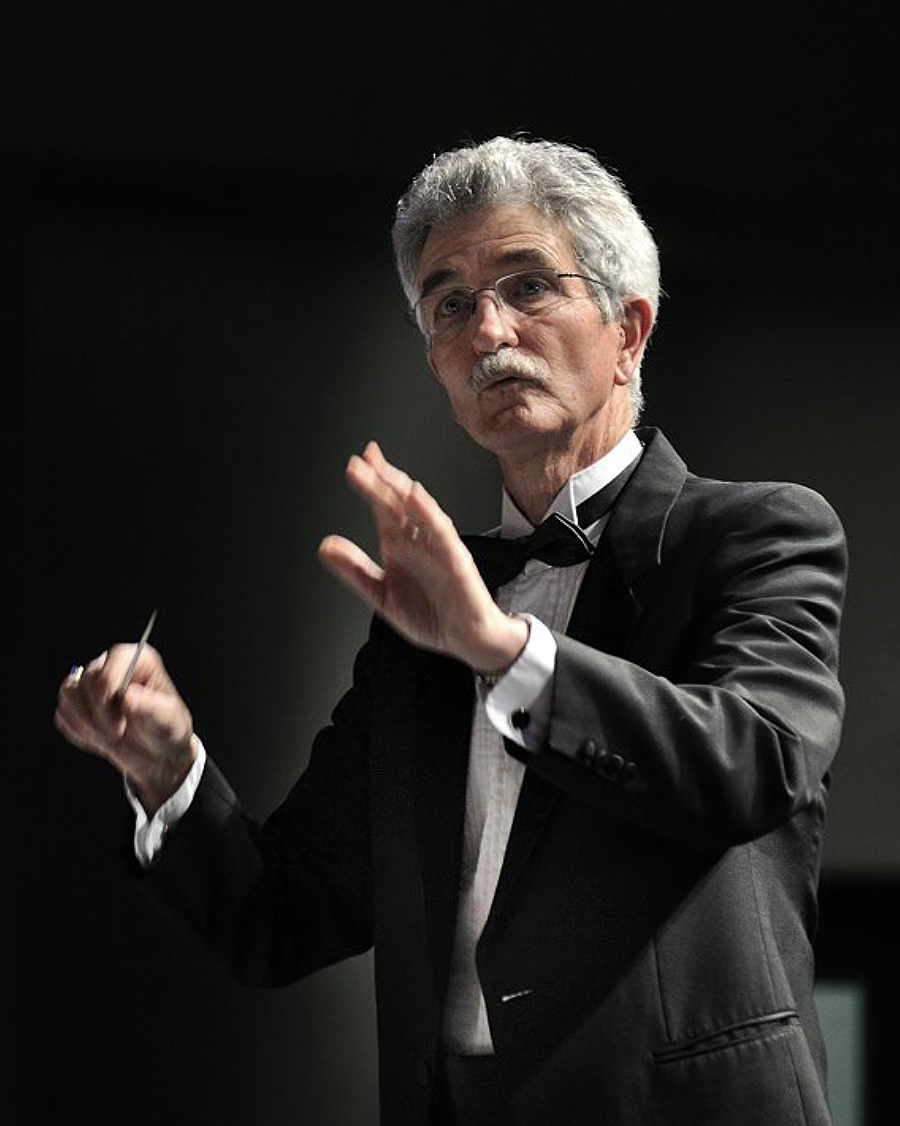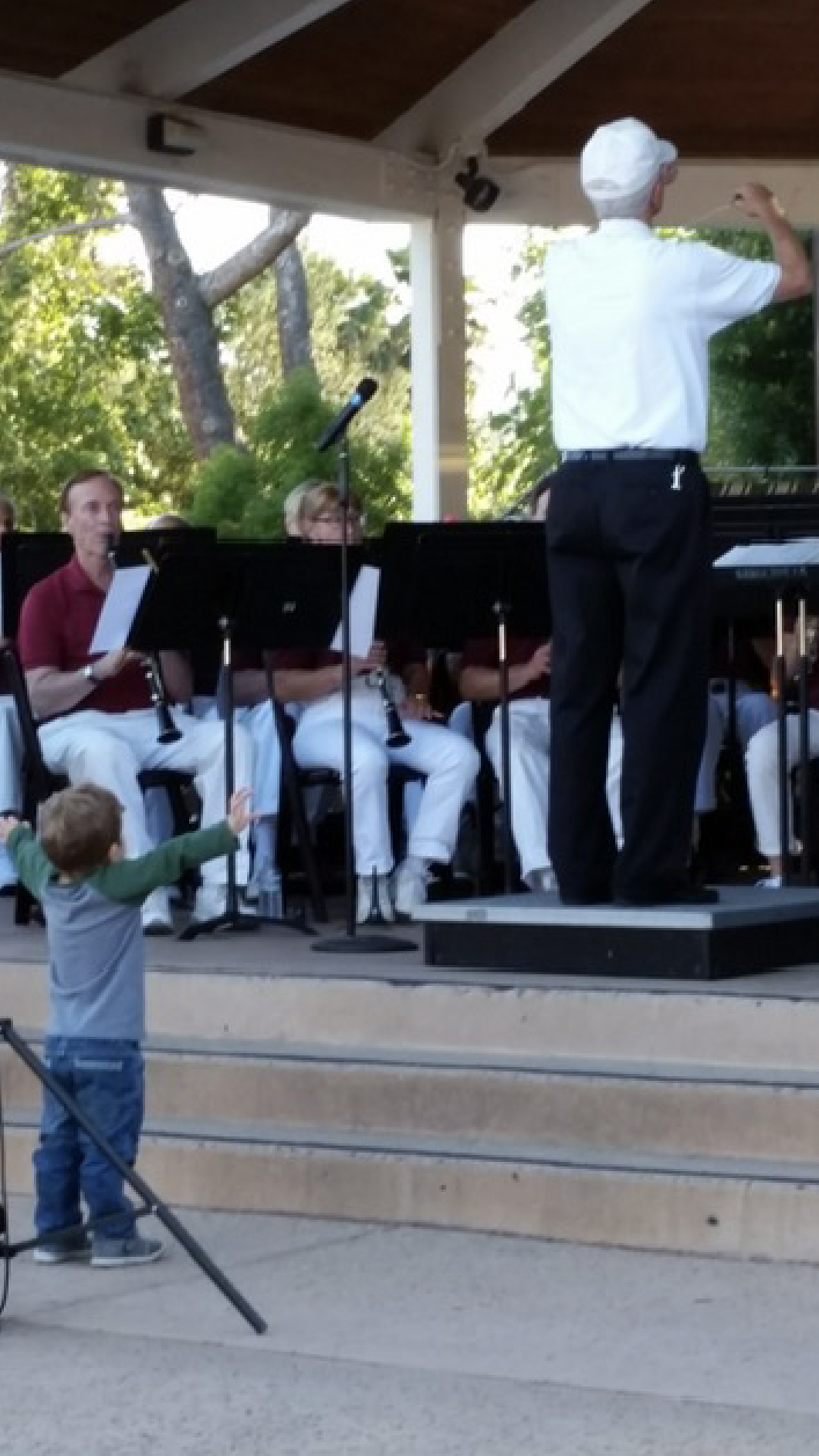Featured Stories
Dean Hickman: Teaching Everybody to Love Music

Dean Hickman
It’s difficult to imagine this town without Dean Hickman.
An instrumental music teacher in the San Diego Unified School District for 33 years, Mr. Hickman shared the magic of making music with thousands of students, earning the 2001 San Diego County Teacher of the Year award. He also created musical opportunities for adults as the director of the Pomerado Community Band, which he will conduct at his final local concert on August 4 at 5:30pm under the gazebo in Old Poway Park before relocating to Kalamazoo, Michigan with his wife, Kris.
As a former student of Mr. Hickman’s and a music teacher now myself, I could not let him leave without first sitting down to discuss his career. What kept him motivated in a profession that can be equal parts exhilarating and exhausting? Read on for Mr. Hickman’s story in his own words.
SAN DIEGO TROUBADOUR: Okay cool, we’ll start at the beginning. I know you’re from Sacramento. When did you start with music?
DEAN HICKMAN: When I was six. What happened was in my family, I had a brother two years younger than me, and when each of us turned six, it wasn’t, “Would you like to learn music?” it was, “Which instrument do you want to play?” And there were two choices: piano or accordion. So, I started accordion lessons for about four years. When I was 10, all of a sudden being in the school band became a possibility, and there just weren’t any openings for an accordion, so my dad took me around to the music store. I started playing trombone as a fifth grader in the school band and still play it today.
SDT: I’m guessing you continued on with that throughout high school?
DH: Oh yeah, through high school and through college.
SDT: I know you went to Berkeley, and I know you were in ROTC, but I didn’t know that you were also in a band at that time.
DH: Oh yeah, I was in the Cal Band, which is the marching band for the university, and I also would take concert band courses. I stayed involved, but I wasn’t a music major, because once I got a scholarship through the Navy, there was a small list of majors that you were not allowed to pursue, and music was one of those. I thought, “Well, I want to graduate in four years, so what course of study am I on track for?” The only one was math, so okay, I’ll be a math major. I finished out the math major, but I took a lot of music courses as well, such that when I graduated I had enough units to declare a music minor.
SDT: So, that was when you went into the submarine service right after you graduated. I’m guessing there probably weren’t a lot of ways to keep music going while you were on a submarine?
DH: Not a lot, yeah. They kind of frown on trombone playing in a submarine.
SDT: So, when you got out of the Navy, did you immediately know you wanted to be a teacher?
DH: I knew I wanted to be a teacher within the first week of being in my own high school band. It was like Home Central right away; this is what I want to do! I was in a very strong music department. It was a marching band, but the main emphasis was concert band. I got into it pretty easily, because we played some rather challenging literature. [Becoming a teacher] was the plan all along.
SDT: After you got your teaching credential, you started at Point Loma High School, right?
DH: Right.
SDT: Okay, and you were there for two years?
DH: [Yes], two years.
SDT: And is that when you started at Madison High School?
DH: Yes, I went to Madison in 1978.
SDT: How long were you there?
DH: Nine years.
SDT: Your kids went there, right?
DH: They both went through there, yes. My son was a freshman at Madison my last year there as the band director, so I had him as a student for one year. My daughter was two years behind him.
SDT: I know your son Kip is in an orchestra, right?
DH: He plays trombone—surprise, surprise—and [my daughter] Theresa played French horn.
SDT: Very cool. So, after Madison, you went to Mira Mesa High School?
DH: Right.
SDT: Okay, did you open Mira Mesa?
DH: Nope.
SDT: Scripps Ranch High School is the one you opened.
DH: Correct.
SDT: How long were you at Mira Mesa?
DH: Well, interesting answer—I was at Mira Mesa seven years, but the last year I was at Mira Mesa was the first year of Scripps, so I ended up teaching at both high schools that one year.
SDT: Oh my God…

Hickman conducting his student orchestra.
DH: It was a crummy calculation on my part, because I had a good program going at Mira Mesa. You never know what’s going on with a new school, but at the same time, you don’t often get a chance to open a new school, start traditions, that kind of thing. So, I did both schools; I did Mira Mesa in the morning and Scripps Ranch in the afternoon. My plan originally was to do it for five years in order to give it a fair evaluation. I barely made it through marching season, because both schools marched.
SDT: Mr. Hickman, I have to say: that’s crazy!
DH: And it turned out to be crazy, yeah, but it just leaned me toward going to Scripps for the newness of it. Also, Ms. Hickman was hired as the color guard auxiliary teacher at Scripps, and I had already done a little bit of competing against her when I was back at Madison, because she did some color guard work at Serra [now Canyon Hills High School]. I was very fortunate that the person who came in after me at Mira Mesa, [Jeanne Christensen], has just taken that program and shot it to the stars.
SDT: What was it like working with Ms. Hickman? (Ms. Hickman laughs in the background)
DH: She just laughed. It was really good overall. Rehearsals…well, I mean, you went through them…
SDT: Yeah…
DH: I had one basic concept of how a [marching band] rehearsal should run, particularly early, on as people are learning the drill. I was ready to move on, and I’m down on the field while Ms. Hickman is up in the stands watching. She [would say] nope, don’t move yet, and she would move the color guard people, you know, okay, step and a half to your left, okay, come forward a little bit, and I’m sitting down there [going] “Come on, we need to move along!” I’m sure you and the rest of the students could see the struggle going on between us, but we got it done. The color guard program was successful in its own right, and I always enjoyed watching what she and Randy Arnayro got done with the winter guard; they did some phenomenal stuff.
SDT: So, after Scripps, you went to Wangenheim Middle School. How long were you there?
DH: Six years.
SDT: Did you retire after that?
DH: Yes, I retired in 2009.
SDT: At some point in all of this, you started working with the Pomerado Community Band. When did that happen?
DH: 1990.
SDT: How did you get started doing that?
DH: Well, a member of the band who is still in it had done a business-related master’s project on how to start a community band.
SDT: Who was it?
DH: Debbie Olson, a flute player. She finished the project, and then it was, “Well, if I’m going to talk about it, I might as well do it.” So, she lived in the Poway area and found four or five other people who were musicians that lived in the Poway area. They became the first board and put out feelers to start a community band, both for band members and to find a conductor. They interviewed me, and we had our first rehearsal on April 30, 1990.
SDT: How was it different to work with your students during the day versus these adult community band students at night?
DH: Well, there were 20 to 30 or more years of age difference, but when you’re dealing with high school-age students, there’s a certain level of experience that they have or don’t have, and it’s your job to meld all that together and create a working, functional music program. With a community band, these are adults with whole bunches of different ability levels. We had some near professional-level players that wanted to keep playing. We had some people that had been playing in high school and wanted to play again, which is a core element of the community band experience. And working to mold those in an adult environment was a challenge to say the least. When I started, I was [in my] mid 40s, and I’m thinking, how can I be an authority figure to people that are a lot older than me? What can I tell somebody who’s maybe played professionally for 20 or 30 years? And one day I realized, wait a second…all these people can play out of tune. They can miss key signatures. They can mess up rhythms. They can play too loud or not loud enough. I’m good; I’ve got this!
SDT: Was the community band energizing for you at all?
DH: Basic answer, yes. That doesn’t mean that I wouldn’t get home from a community band rehearsal, and after being at school from 7 in the morning all the way through 9:30 at night, that I wasn’t tired, but music in general has a way of energizing me, and my hope is that I’m able to take that energy and pass it along to others. So, I would be maybe physically tired and maybe mentally tired, but I don’t think I ever got emotionally tired until right in my last year at Scripps when everything really started piling up.
SDT: Do you have any one particular stand-out experience from your time teaching?
DH: Yeah, the first big trip we did when I was at Madison when we went to Switzerland for a week and participated in a music festival of American high school groups. That was a cool time. Not everybody in the band was able to go, and that’s going to be the case any time you take a big trip, so that creates an extra challenge when you come back; now, two-thirds of the students in the room are talking about, “Oh, you remember when we went in and TP’d Mr. Hickman’s hotel room?”
SDT: They TP’d your hotel room?
DH: Big time. And the parents got the key to our room to help the kids do it!
SDT: What advice would you give to somebody who’s thinking about going into music education?
DH: The teaching profession in general is not held in high regard in this society, so you’d better enjoy it, music even more so, because the demands outside the classroom are going to be pinging on you for attention: parents, administrators, outside interests, you know, “Can you bring your band over to Mira Mesa Mall to play for the arrival of Santa Claus?” Things pop up that you have to be able to adapt to very quickly, because everybody wants a little piece of you, and you have to understand that’s part of the gig. A music teacher has the greatest amount of influence if they’re doing it out of love and [they] get everybody to love music.
This interview has been edited for length and clarity.










